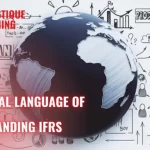The International Financial Reporting Standards (IFRS) are a set of globally recognised accounting principles and guidelines developed by the International Accounting Standards Board (IASB). They aim to create a standardised framework for financial reporting, fostering consistency and comparability across international markets.
Unlike country-specific accounting standards, IFRS provides a common language for businesses, investors, and regulators worldwide. Adopting IFRS is crucial for businesses operating in a globalised economy, as it facilitates transparent and accurate financial reporting.
Adhering to IFRS enhances companies' credibility, streamlines cross-border transactions, and attracts international investment. The standards promote financial transparency, helping stakeholders make informed decisions and fostering trust in financial markets.
As businesses increasingly engage in global activities, the adoption of IFRS becomes essential for navigating complex financial landscapes and ensuring alignment with international best practices.
Upon completion of this course, participants will be able to:
- Develop a practical understanding of IFRS standards through real-world explanations and examples.
- Explore the mechanics of financial statement consolidation under IFRS 10.
- Gain proficiency in the application of the new Revenue standard, IFRS 15.
- Access the current IAS and IFRS standards to enable an in-depth review of your company’s processes.
This course is designed for anyone responsible for reporting financial information to enable strategic decision-making or using financial information to secure projects or contracts. It would be most beneficial for:
- Accountants
- IT Consultants
- Security Analysts
- Data Analysts
- Finance Managers
- Auditors
- Risk Assessors
- Business Owners
- Chief Financial Officers
- Pension Fund Managers
- Portfolio Managers
- Creditor or Investors
This course uses a variety of adult learning styles to aid full understanding and comprehension. Participants will review real-world case studies on how the IFRS has affected large companies and learn about the pros and cons of making a transition to this methodology.
They will be shown various reporting systems and metrics of measurement in order to make secure financial decisions and discuss report writing in order to incorporate the IFRS into current strategic development across various industries.
Day 5 of each course is reserved for a Q&A session, which may occur off-site. For 10-day courses, this also applies to day 10
Section 1: Accounting Policies and IFRS Financial Statements
- Overview of accounting policies and their significance in financial reporting.
- Principles and guidelines for selecting and applying accounting policies under IFRS.
- Understanding the structure and components of IFRS financial statements.
- Recognition and measurement of assets, liabilities, income, and expenses in IFRS financial statements.
- Impact of accounting policies on financial statement presentation and disclosure.
- Common challenges and issues related to accounting policies under IFRS.
- Changes in accounting policies and their implications on financial reporting.
Section 2: Assets and Inventory Management
- Comparative analysis of accounting policies across different industries.
- IFRS disclosure requirements and their importance in transparent financial reporting.
- Fundamentals of asset management within the context of IFRS.
- Recognition and measurement of assets under IFRS guidelines.
- Depreciation methods and impairment testing for asset valuation.
- Inventory valuation methods and their application in IFRS reporting.
- Impact of IFRS on lease accounting and asset recognition.
- Techniques for effective asset tracking and management under IFRS.
- Accounting for intangible assets and their disclosure requirements.
- IFRS considerations in managing fixed and current assets.
- Inventory management strategies aligned with IFRS principles.
Section 3: Liabilities, Leases & Employee Benefits
- Implications of IFRS standards on lease accounting and reporting.
- Lease classification, measurement, and disclosure requirements.
- Employee benefit obligations and their accounting treatment under IFRS.
- Pension plans, post-employment benefits, and other long-term employee benefits.
- Short-term and long-term employee benefits: accounting and reporting distinctions.
- IFRS guidelines for measuring and presenting provisions and contingent liabilities.
Section 4: Financial Structures & Income Taxes
- Accounting for income taxes and their effects on financial statements under IFRS.
- Deferred tax assets and liabilities: recognition, measurement, and presentation.
- Impact of changes in tax rates on financial structures and reporting.
- IFRS guidelines for accounting for uncertain tax positions and uncertainties.
- Tax planning strategies within the framework of financial structures.
- Disclosures related to income taxes and financial structures in financial statements.
Section 5: Revenue & Foreign Currency Challenges
- Accounting for multiple-element arrangements and bundling of goods and services.
- Impact of variable consideration and constraints on revenue recognition.
- Foreign currency transactions: recognition, measurement, and reporting challenges.
- Translation of foreign currency financial statements under IFRS.
- Managing exchange rate fluctuations and their effects on revenue.
Section 6: Consolidations & Combinations
- Consolidation procedures for subsidiaries, associates, and joint ventures.
- Determining control and the role of IFRS 10 in consolidation.
- Elimination of intercompany transactions and balances in consolidated financial statements.
- Accounting for non-controlling interests (NCI) in consolidated financial statements.
- Preparation and presentation of consolidated cash flow statements under IFRS.
Section 7: The Future of IFRS & How to Transition
- Evolution of IFRS and emerging trends in international financial reporting.
- Implications of ongoing IFRS developments for businesses and financial professionals.
- Exploration of potential future changes and updates to IFRS standards.
- Adoption of new accounting standards and their impact on financial reporting.
Upon successful completion of this training course, delegates will be awarded a Holistique Training Certificate of Completion. For those who attend and complete the online training course, a Holistique Training e-Certificate will be provided.
Holistique Training Certificates are accredited by the British Assessment Council (BAC) and The CPD Certification Service (CPD), and are certified under ISO 9001, ISO 21001, and ISO 29993 standards.
CPD credits for this course are granted by our Certificates and will be reflected on the Holistique Training Certificate of Completion. In accordance with the standards of The CPD Certification Service, one CPD credit is awarded per hour of course attendance. A maximum of 50 CPD credits can be claimed for any single course we currently offer.
- Course Code PF1-146
- Course Format Classroom, Online,
- Duration 5 days














